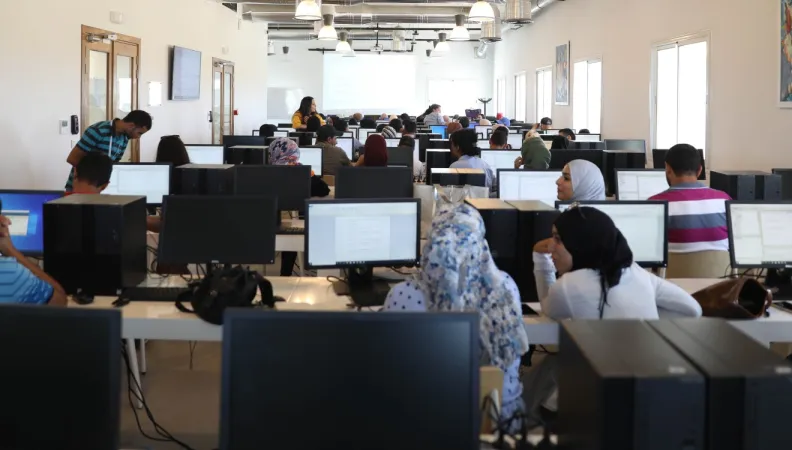Share the page
Elife project: Training unemployed graduates for high-growth digital sectors
Project
This project is carried out with the support of the European Union



-
Project start date
-
Status
Ongoing
-
AFD financing amount
-
€ 3 000 000
-
Country and region
-
Location
-
Siliana, Béja, Le Kef, Jendouba, Kairouan, Sidi Bouzid, Gafsa, Tozeur, Gabes and Medenine
-
Type of financing
-
Partners
-
European Union
-
Beneficiaries
-
Tunisia Foundation For Development
This project is carried out with the support of the European Union

The content of this project information sheet falls under the sole responsibility of the AFD and does not necessarily reflect the opinions of the European Union.
Many young graduates with training in new technologies from higher institutes of technology (ISET) remain unemployed. The paradox is that companies within the sector are struggling to hire employees. The ELIFE project, sponsored by the Tunisia Foundation for Development (FTD) with support from AFD, works to balance supply and demand of labor in this promising sector.
Context
The unemployment rate remains very high among graduates from higher institutes of technology (ISET), which train students for careers in the digital sector. This is particularly true in regions where unemployment of these young people leads to significant frustration, social instability and economic loss. At the same time, many positions in the new technologies sector remain unfilled.
The ELIFE project is part of the Youth, Entrepreneurship and Digital Technology initiative (JET), officially established by a declaration of intent signed between the governments of France and Tunisia during French President Emmanuel Macron’s visit to Tunisia in 2018. ELIFE aims to combat unemployment among graduates and meet the needs of the growing ICT sector. It supports Tunisia’s goal of becoming a digital hub in Africa.
Description
The ELIFE project is implemented by the Tunisia Foundation for Development (FTD) and supports the construction and management of ten centers for technology, entrepreneurship, training and culture in ten medium-sized cities in Tunisia. It targets the governorates with the highest unemployment rates and, consequently, the lowest rates of human development.
The project offers a two-phase training program for ISET graduates seeking employment. The first phase is a short, four-month training period focused on strengthening soft skills and acquiring technical specialization. Through active teaching methods, it complements students’ initial training and offers a certification. The second is a professionalization phase in which participants are faced with practical and collaborative projects based on the needs of the companies who offer the students professional support for six months.
Impacts
The project enhances the employability of young graduates in digital sectors from ISET in the 10 governorates most affected by unemployment. It facilitates the social and cultural integration of these students in jobs with high added value. The project therefore contributes to restoring regional balance. The six-month objective after completion of the training is a minimum employment rate of 70%.
With the integration of new skilled human resources that match the needs of companies in the sector, the initiative is sure to strengthen Tunisia’s strategic digital economy.


